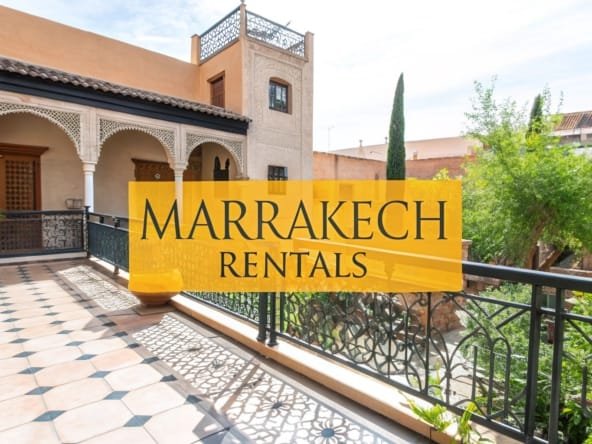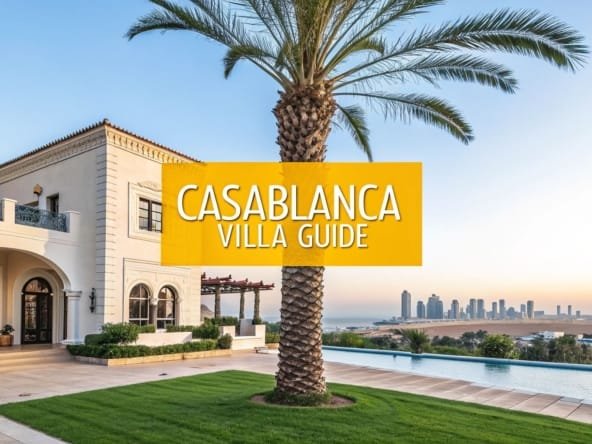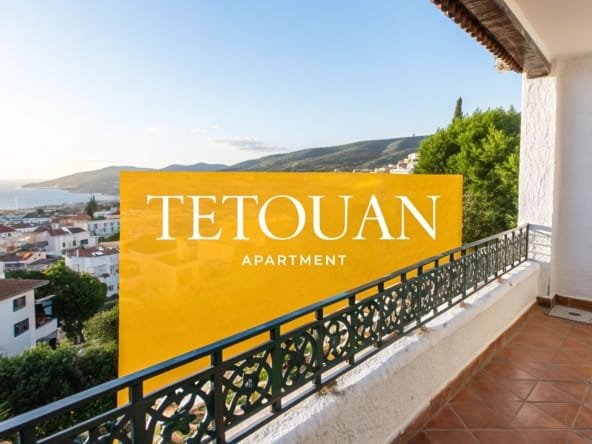Understanding Your Expenses in Morocco
Living in Morocco presents unique financial considerations, whether you're planning to retire in Marrakech, start a business in Casablanca, or rent long-term in a coastal town. As this North African country continues to attract international property buyers, expats and investors, understanding the true cost of living becomes essential for making informed decisions.
Traditional expense analysis focused mainly on basic needs like housing and food. However, today's globally mobile professionals and digital nomads need a more complete picture that includes lifestyle factors, healthcare costs, and market dynamics between different regions. A thorough cost analysis must provide context by comparing expenses across cities and between urban and rural areas.
This guide examines eight key spending categories that shape daily life in Morocco. We'll help you develop an accurate budget and avoid unexpected costs – whether you're buying property, signing a lease, or planning monthly expenses. From shopping in traditional markets to managing utilities, you'll gain practical insights for confidently handling your finances in Morocco.
1. Housing and Rent
Housing represents the highest monthly expense for anyone living in Morocco. Whether renting an apartment, buying property, or investing in real estate, it's essential to understand the local housing market. Costs vary significantly based on factors like location, property type, and current market dynamics.
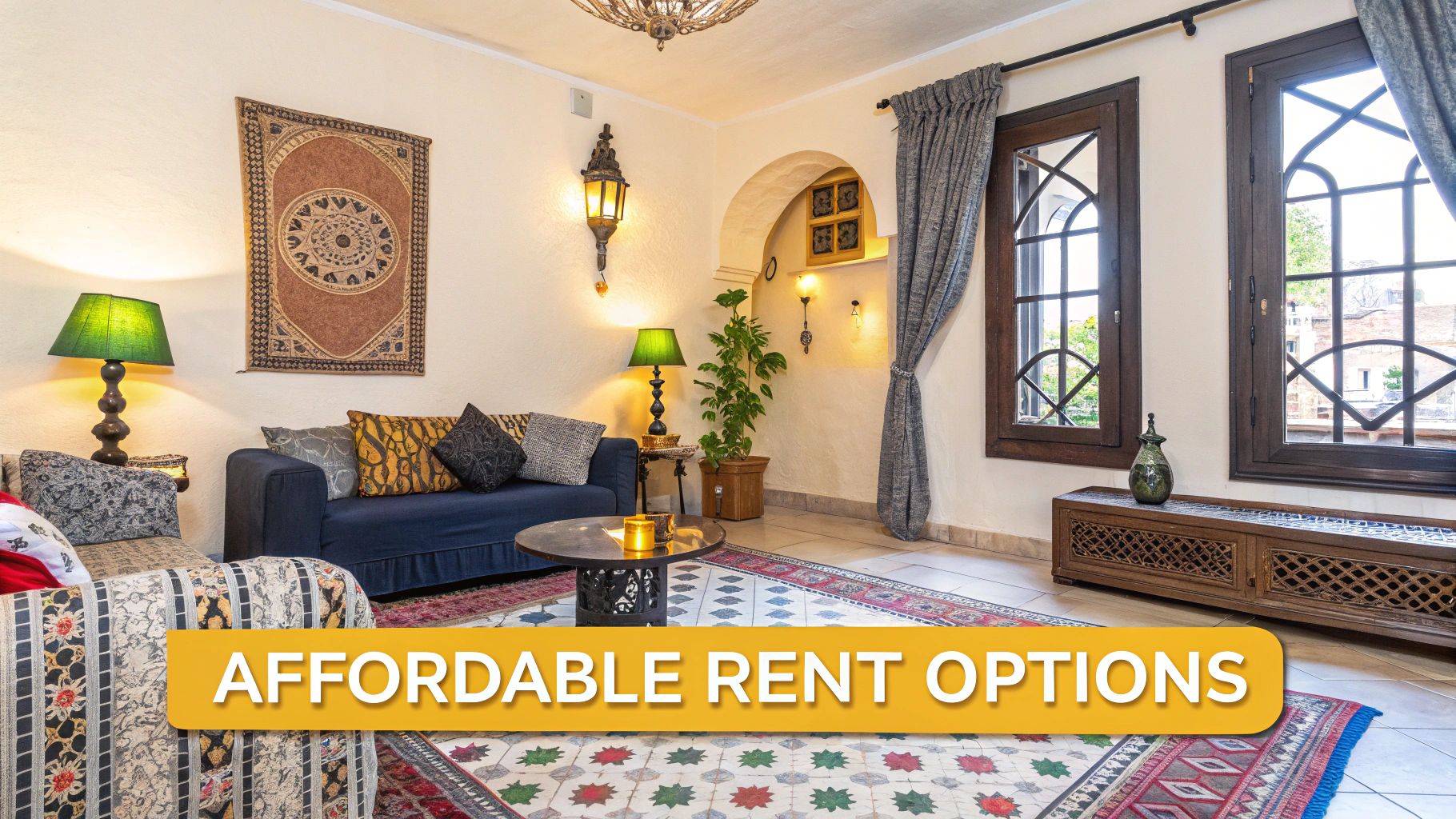
Beyond rent, housing costs include utilities (water, electricity, internet) and maintenance. The market offers diverse options – from modern apartments in Casablanca to traditional riads in Marrakech. This variety means there are housing solutions for different budgets.
Features of the Moroccan Housing Market:
- Property Options: Choose from traditional riads and dar townhouses in historic medinas, or modern apartments and villas in new developments
- Standard Utilities: Monthly bills cover water, electricity, and internet/phone services
- Location Impact: Prices vary greatly by area – city centers and tourist zones command premium rates compared to suburbs and smaller towns
Pros:
- Cost-Effective: Housing costs are generally lower than in Western countries
- Architectural Diversity: Mix of traditional and contemporary housing styles
- Value Opportunities: Good deals available, especially in traditional areas or with long-term rentals
Cons:
- Tourist Area Inflation: Popular destinations like Marrakech have seen significant price increases
- Basic Tenant Protection: Rental laws offer limited protections compared to other countries
- Communication Challenges: Language barriers can complicate housing transactions without Arabic or French skills
- Construction Standards: Building quality varies considerably between properties
Typical Monthly Rental Prices:
- 1-bedroom apartment (Casablanca center): 3,500-5,000 MAD
- 3-bedroom apartment (Rabat suburbs): 6,000-8,000 MAD
- Traditional riad (Marrakech medina): 7,000-12,000 MAD (higher for larger or renovated properties)
Housing Market Tips:
- Always Negotiate: Especially for long-term rentals
- Consider Sharing: Split costs through shared housing in expensive cities
- Check All Systems: Test utilities before signing any agreements
- Document Everything: Obtain detailed written rental contracts
- Use Local Experts: Partner with established real estate agents for market guidance
Morocco's housing sector continues to grow, with new developments emerging alongside traditional homes. Population growth and increasing numbers of expats and tourists drive demand, particularly in urban centers and tourist areas. Understanding these market fundamentals helps make informed housing decisions.
2. Food and Groceries
Understanding food costs is essential when planning your life in Morocco. This section explains grocery shopping and dining expenses to help you budget effectively and make informed decisions.
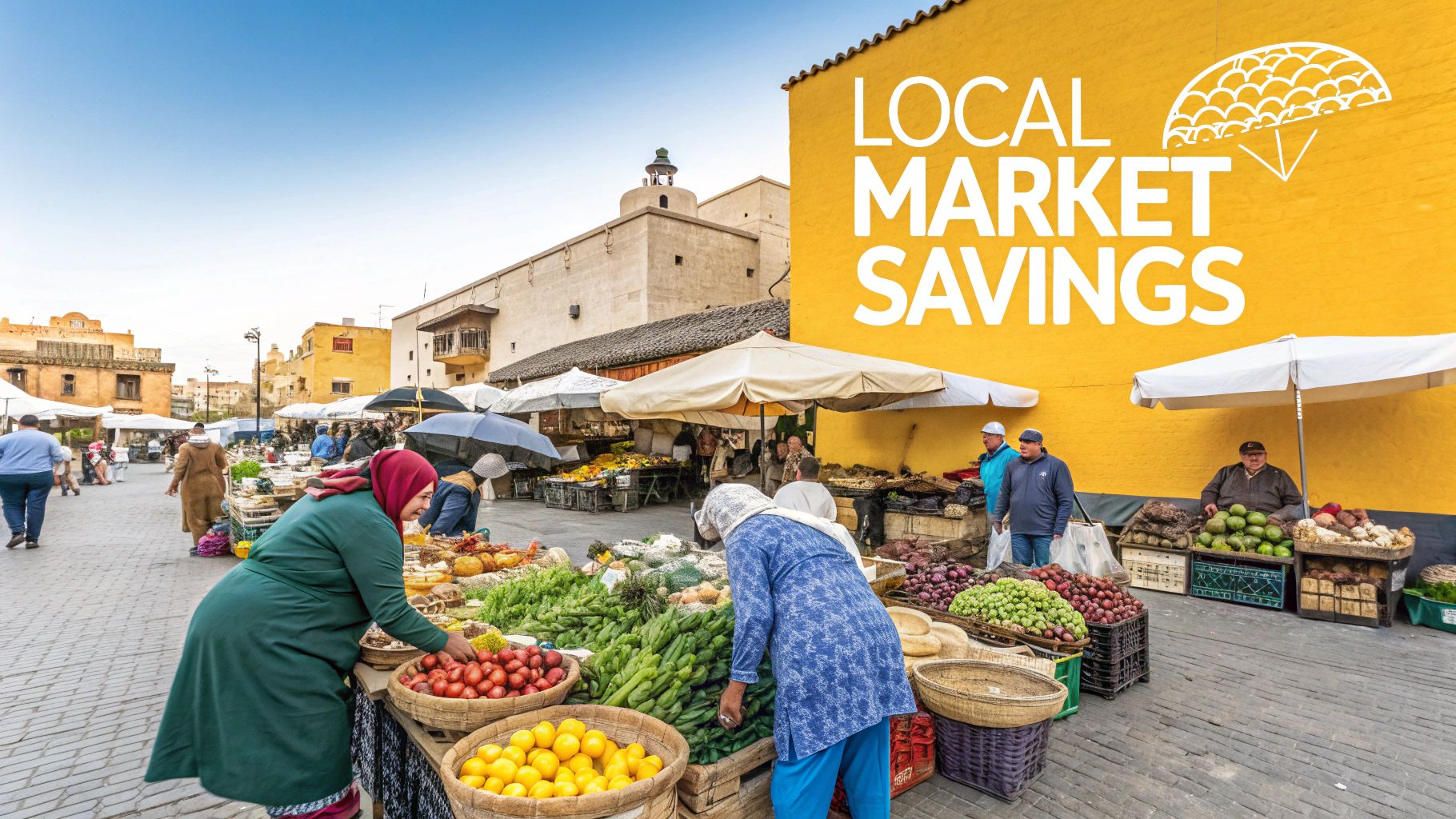
Morocco offers two main shopping experiences – traditional souks (markets) full of fresh produce and spices, and modern supermarkets like Marjane and Carrefour that stock imported goods. While supermarkets are popular in cities, souks remain central to commerce in smaller towns.
Key Aspects of Moroccan Food Shopping:
- Dual Shopping Options: Choose between vibrant souks and convenient supermarkets
- Fresh Seasonal Produce: Access high-quality fruits and vegetables that vary by season
- Mix of Products: Find both local specialties and imported items
Advantages:
- Quality Local Produce: Get farm-fresh fruits and vegetables at reasonable prices
- Affordable Staples: Save money on Moroccan basics like couscous and meat
- Diverse Food Options: Experience a wide range of traditional ingredients and dishes
Challenges:
- Higher Import Prices: Expect to pay more for international products
- Price Differences: Costs vary between cities and regions
- Seasonal Price Changes: Produce availability and costs shift with seasons
Real Cost Examples:
- Monthly Food Budget: Single person typically spends 1,500-2,500 MAD on groceries
- Market Vegetables: Fresh produce costs 5-15 MAD per kilogram
- Restaurant Meals: Dining out ranges from 30-150 MAD per person
Smart Shopping Tips:
- Shop at local souks for the best deals on fresh items
- Choose seasonal products for better prices and quality
- Compare prices between markets and supermarkets
- Learn basic Arabic phrases for better market navigation
Food costs significantly impact your living expenses in Morocco. Whether you're buying property, renting, or running a business, understanding local food markets helps you plan your budget and enjoy Morocco's rich food culture.
3. Transportation
Getting around Morocco involves various transportation options that affect living costs for residents, property owners and businesses. Understanding these options helps in managing daily commuting needs and exploring the country effectively.
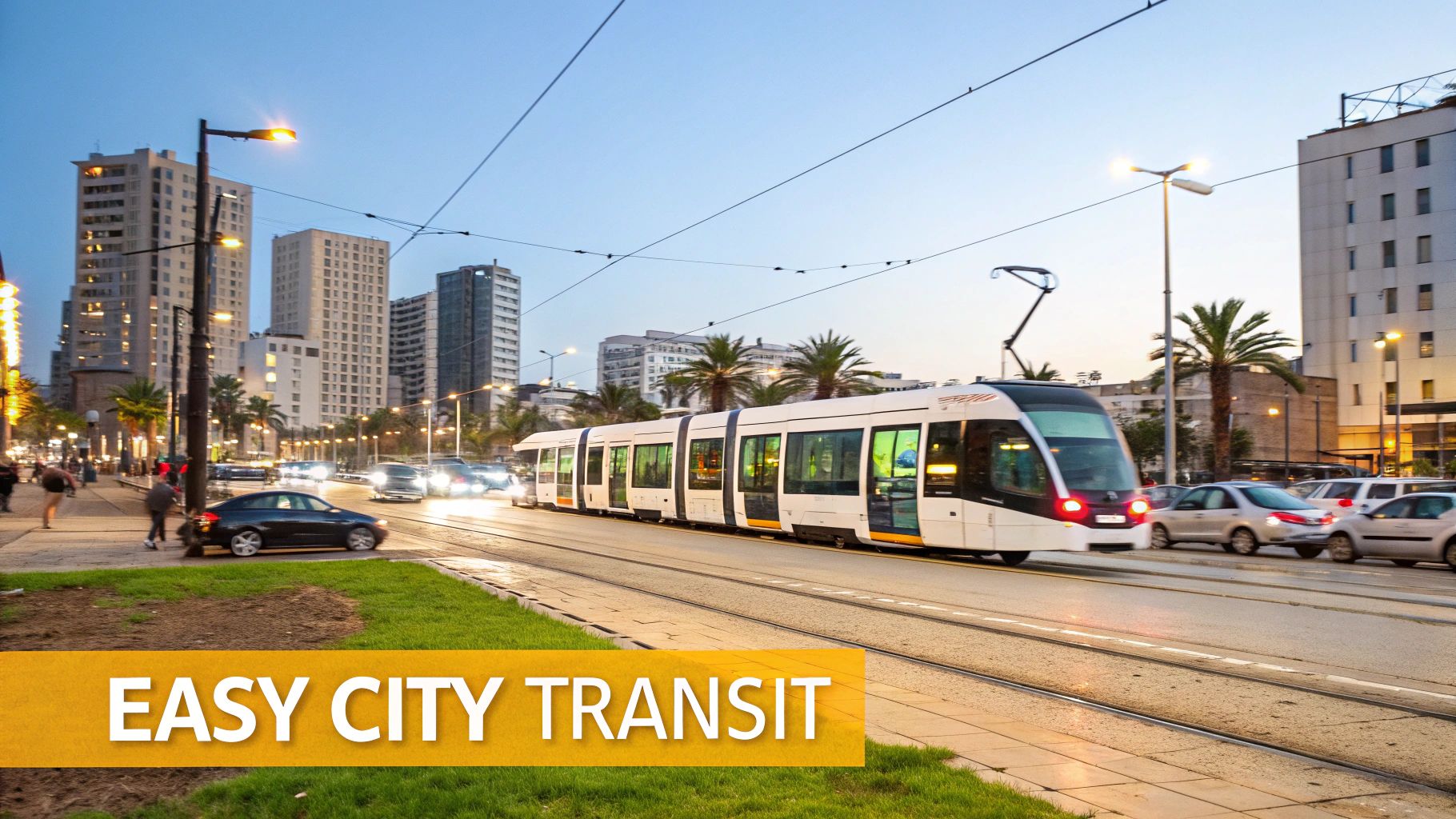
Major cities like Casablanca and Rabat have modern tram systems that have made urban travel more efficient and reduced traffic. Taxis are widely available across Morocco, though prices need negotiation. For travel between cities, the national railway ONCF provides reliable service. CTM buses offer budget-friendly options for longer trips.
Key Transportation Options:
- Trams in major urban centers
- Extensive taxi networks
- Inter-city trains connecting main cities
- Local and long-distance bus services
- Private vehicle options
Advantages:
- Budget-friendly public transport
- Good urban coverage with trams and taxis
- Quality infrastructure in larger cities
Challenges:
- Fewer options in rural areas
- Heavy traffic during peak hours
- Taxi fares require negotiation
Typical Costs:
- City bus fare: 4-7 MAD per ride
- Taxi within city: 20-50 MAD depending on distance
- Monthly transport pass: 150-350 MAD
- Fuel costs: 11-13 MAD per liter
Smart Transport Tips:
- Use mobile ride-hailing apps in major cities
- Get monthly passes for regular public transit use
- Set taxi fares before starting trips
- Share rides to reduce costs
Recent Improvements:
Morocco's transport system has grown significantly. New tram lines in Casablanca have improved city travel. ONCF has upgraded its train network for better service. Mobile ride-hailing is gaining popularity, giving people more travel choices.
Transportation costs and access directly impact property values and business operations. For homebuyers, commute times affect neighborhood choices. For renters, transport links influence housing decisions. And for businesses, logistics planning depends on understanding the transport network.
4. Healthcare
Healthcare plays a vital role in the cost of living calculations for Morocco, particularly for expats and long-term residents. Morocco's dual public-private healthcare system offers options that balance affordability with quality care.
Public vs. Private Healthcare:
The Ministry of Health oversees Morocco's public healthcare system, with the CNSS (National Social Security Fund) managing health insurance and reimbursements. While public facilities offer basic care at lower costs, they often face issues with wait times and resource limitations, especially in rural regions.
Private healthcare has grown substantially with new investments in modern facilities and equipment. Urban areas feature private hospitals and clinics offering specialized care and shorter wait times. This sector attracts expats and locals seeking higher service levels, supported by major hospital networks and international insurance providers.
Features and Costs:
- Health Insurance: Public CNSS coverage is required for employees. Private plans cost 300-800 MAD monthly with broader coverage. International plans available for expats.
- Doctor Visits: Private GP consultations range from 150-400 MAD. Specialist fees are higher.
- Hospital Stays: Costs vary from 500 MAD daily in public facilities to 2000+ MAD in private hospitals.
- Medication: Prescriptions typically cost 50-200 MAD, notably less than Western prices.
Pros:
- Cost Effective: Medical expenses are significantly lower than Western countries
- Quality Private Care: Modern facilities and specialist care available in private sector
- Affordable Medicine: Wide access to lower-cost generic medications
Cons:
- Public System Limitations: Resource and staff constraints affect public healthcare quality
- Specialized Care Gaps: Some advanced treatments may require travel abroad
- Communication Issues: English/French common in private clinics but limited in public facilities
Practical Tips:
- Get Insurance Coverage: Invest in comprehensive health insurance, either private or international
- Research Private Clinics: Compare costs between facilities for procedures and consultations
- Track Medications: Maintain detailed prescription records
- Consider Public Options: Use public facilities for basic care to manage costs
Understanding Morocco's healthcare system helps ensure access to quality medical care while managing expenses effectively. With proper planning and insurance coverage, residents can benefit from Morocco's affordable healthcare options.
5. Utilities and Services
Understanding utilities and services costs is essential for anyone planning to live in Morocco. These recurring expenses impact your monthly budget and vary based on your usage patterns, property size, and location.
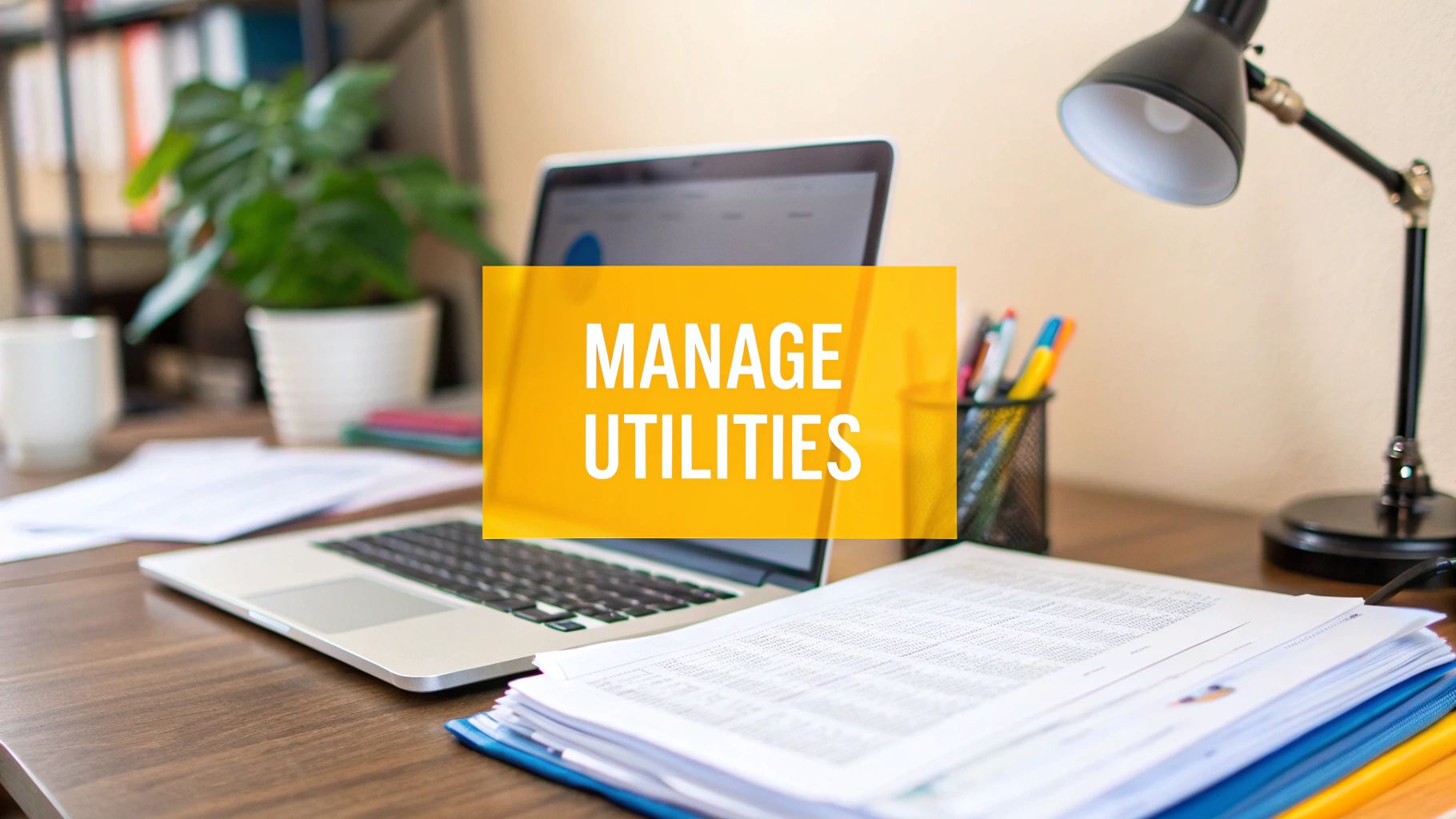
Key Utility Services:
-
Electricity: Provided by LYDEC in Casablanca and REDAL in Rabat. Bills use a tiered system – higher usage means higher rates per kWh. Service is reliable in cities but summer AC use can spike costs.
-
Water: Generally affordable and consumption-based billing. Some areas may experience seasonal shortages during dry periods.
-
Internet: Several providers compete including Maroc Telecom, Orange Morocco, and Inwi. Fiber optic service available in major cities at good rates.
-
Phone: Mobile and landline services widely available with competitive plan options from major carriers.
Key Benefits:
- Usage-based billing helps control costs
- Multiple providers create competitive pricing
- Strong infrastructure in urban areas
- Reliable service in cities
Common Challenges:
- High electricity costs in summer
- Setup fees for new services
- Service quality varies outside cities
- Rural areas may have outages
Typical Monthly Costs (85m² Apartment):
- Basic utilities: 500-900 MAD
- Internet (60 Mbps): 300-500 MAD
- Mobile plan: 100-300 MAD
Money-Saving Tips:
- Monitor peak electricity hours
- Compare internet packages before signing up
- Consider prepaid mobile plans
- Use energy-efficient appliances
- Try negotiating installation fees
- Schedule AC use strategically
With smart consumption habits and an understanding of the local utility systems, you can effectively manage these essential costs while maintaining a comfortable lifestyle in Morocco.
6. Education
Understanding education costs is crucial when planning to live in Morocco. From elementary schools to universities, education expenses can impact your budget significantly. Let's explore the different options, costs, and key information about Morocco's education system.
Morocco's education system includes public, private, and international schools. Public education is free and mandatory until age 15, covering primary and lower secondary levels. While public schools are budget-friendly, quality varies between institutions and classes tend to be large.
Private schools feature smaller class sizes and broader curriculum choices, including multiple language programs in French, English, Spanish, and Arabic. Annual private school fees range from 30,000 to 80,000 MAD. Quality levels differ among private institutions, making research essential. Notable private schools include the American School of Marrakech, Rabat American School, and Casablanca American School, which serve both expatriate and local families.
International schools follow American, British, or French curricula and maintain high educational standards. However, they come with premium pricing – annual fees typically range from 60,000 to 120,000 MAD.
Higher education remains relatively accessible, with university tuition between 5,000 to 50,000 MAD yearly, varying by program and school. Both public and private universities offer diverse fields of study.
Language education plays a key role in local integration. Language schools provide Arabic, French and other courses, with monthly fees ranging from 1,500 to 3,000 MAD.
Pros:
- Free public education system
- Range of private school options
- Multiple language learning opportunities
Cons:
- International schools carry high costs
- Limited space in top schools
- Extra fees for activities in many schools
Key Tips:
- Verify Accreditation: Check school certifications and standards
- Consider Public Options: Good value for basic education
- Research Scholarships: Look for financial aid opportunities
- Compare Private Schools: Evaluate curricula, facilities and costs
Education expenses significantly impact overall living costs in Morocco. This information matters whether you're a parent seeking schools, an individual pursuing language studies, or an investor analyzing local infrastructure. School proximity and quality are important factors when choosing property locations. Understanding the education landscape also helps businesses assess the local talent pool and skill levels.
7. Entertainment and Leisure
Quality of life heavily depends on entertainment and leisure options, making these key factors for residents and investors to consider in Morocco. This section explores the diverse entertainment landscape, from traditional cultural experiences to modern activities.
Morocco presents a dynamic mix of entertainment choices that showcase both its rich heritage and contemporary lifestyle. Visitors and residents can explore everything from ancient medinas and cultural festivals to modern fitness centers and cinemas.
Features:
- Cultural activities and festivals: Experience Morocco's vibrant cultural scene through music performances, dance shows, religious celebrations, and art exhibitions. Cities like Marrakech, Fes, and Essaouira host numerous cultural events.
- Sports and fitness facilities: Find modern gyms, pools, and sports clubs in major cities, plus outdoor activities like hiking, surfing, and golf courses.
- Cinema and theater: Watch international and Moroccan films at modern cinemas like Megarama. Theater venues feature both traditional and contemporary performances.
- Restaurant dining and cafes: Enjoy traditional Moroccan dishes at local restaurants or international cuisine at upscale venues. Cafes offer relaxed settings for coffee, tea, and light meals.
Pros:
- Unique cultural experiences: Access authentic Moroccan entertainment not found elsewhere
- Budget-friendly local activities: Many cultural events and markets provide affordable entertainment options
- Diverse outdoor recreation: Take advantage of Morocco's varied landscapes for hiking, surfing, and desert adventures
Cons:
- Limited premium venues: High-end entertainment facilities like opera houses and large concert venues are still developing
- Price fluctuations: Tourist activities often have seasonal price changes
- Some gender-specific venues: Certain traditional activities may maintain separate spaces for men and women
Typical Costs:
- Movie ticket: 50-80 MAD
- Gym membership: 250-500 MAD/month
- Coffee in a cafe: 15-30 MAD
- Cultural event ticket: 100-300 MAD
Tips:
- Use student discounts at cinemas, gyms, and cultural venues
- Look for free events during festivals and holidays
- Book group activities to access better rates
- Consider annual memberships for regular activities to save money
The entertainment options in an area directly affect property values and rental demand. Understanding the local entertainment scene helps buyers, renters and investors make informed decisions about Moroccan real estate. This overview provides key insights into entertainment choices and costs to help assess if they match your lifestyle and investment goals.
8. Clothing and Personal Care
For anyone planning to live or invest in Morocco, clothing and personal care represent a key part of daily expenses. From local markets to modern shopping centers, the country offers diverse options that fit different budgets and preferences.
Shopping in Morocco provides an interesting mix of experiences. You can browse traditional souks filled with locally-made clothing and natural beauty products, or visit contemporary malls featuring international brands. This variety helps residents manage their spending effectively based on their needs.
Features:
- Shopping environments: Traditional souks and modern retail centers provide different shopping experiences
- Personal care options: Services like haircuts, styling, hammams and spa treatments are available at different price points
- Clothing selection: Choose from affordable local garments to high-end international fashion
- Beauty and hygiene: Find local and imported products in supermarkets, pharmacies and specialty stores
Pros:
- Cost-effective local items: Locally made clothing and personal care products offer good value
- Professional services: Expert barbers, hairdressers and beauty specialists provide excellent service at reasonable rates
- Choice of retailers: Multiple shopping venues let you select experiences matching your budget
Cons:
- Higher import prices: International brands cost more due to duties and taxes
- Size availability: Finding larger sizes can be difficult, especially in local stores
- Quality variations: While many local items are well-made, careful inspection is recommended when shopping in souks
Examples of Costs:
- Basic clothing item: 100-300 MAD
- Haircut: 50-150 MAD
- Monthly personal care products: 200-500 MAD
- Brand name clothing: 300-1000 MAD
Tips for Managing Costs:
- Visit local markets: Souks offer lower prices on many items. Practice negotiating for better deals.
- Combine local and imported: Buy local basics while selecting imported items for specific needs
- Look for sales: Take advantage of seasonal discounts at retailers
- Compare locations: Check prices across different neighborhoods and cities
Popular Shopping Destinations:
- Morocco Mall (Casablanca): Major shopping center with international brands and entertainment
- Traditional souks: Found throughout Morocco, offering authentic goods at competitive prices
- International stores: Growing presence of global retail chains in major cities
Understanding clothing and personal care costs helps create an accurate budget for living in Morocco. By using different shopping options wisely and watching for good deals, you can maintain your preferred lifestyle without excessive spending. Consider these expenses carefully when evaluating property investments or planning your move to Morocco.
8-Point Expense Comparison: Morocco Cost of Living
| Expense Category | Complexity 🔄 | Resource Requirements ⚡ | Expected Outcomes 📊 | Ideal Use Cases 💡 | Key Advantages ⭐ |
|---|---|---|---|---|---|
| Housing and Rent | High negotiation, formal contracts | High monthly investment, location-dependent | Secure, stable housing with potential cost-savings | Urban living, long-term rental agreements | Variety of styles, competitive pricing |
| Food and Groceries | Low–moderate, seasonal variations | Moderate, flexible budgeting | Balanced diet with cost-effective local sourcing | Daily sustenance, dining out options | Fresh local produce, rich variety |
| Transportation | Moderate, multiple service options | Low to moderate, affordable transit options | Efficient urban mobility and reliable travel | Daily commuting, inter-city travel | Affordable, reliable urban service |
| Healthcare | Moderate, mixed public & private systems | Moderate to high, insurance dependent | Access to essential and specialist care | Routine check-ups and emergency care | Affordable medications, quality private care |
| Utilities and Services | Moderate, variable billing systems | Moderate, usage-based costs | Reliable provision of essential services | Residential needs, cost-controlled usage | Multiple providers, competitive market |
| Education | High planning, varied institution types | High investment, especially in private schools | Quality learning and personal development | Long-term academic and career building | Diverse options, potential for scholarships |
| Entertainment and Leisure | Low, flexible planning | Low to moderate, discretionary spending | Enriched cultural and social experiences | Leisure, outdoor recreation, group events | Rich cultural scene, affordable local activities |
| Clothing and Personal Care | Low, routine shopping process | Low to moderate, price-sensitive | Consistent personal grooming and style | Daily wear and personal upkeep | Affordable local options, diverse retail choices |
Making the Most of Your Dirham
Living comfortably in Morocco requires smart planning and budgeting strategies. Understanding expenses for housing, groceries, and leisure activities helps create a realistic budget while experiencing everything Morocco has to offer. Smart spending lets you participate fully in local life, from shopping at vibrant neighborhood markets to enjoying traditional cuisine at family-owned restaurants.
Location makes a big difference in costs across Morocco. Major cities like Marrakech and Casablanca tend to be more expensive than smaller towns or coastal regions. Research different areas to find one matching both your budget and lifestyle preferences. Learning basic Arabic phrases is essential, especially for shopping at local markets and discussing prices.
Adopting local habits leads to significant savings. Using public transportation instead of taxis cuts transportation costs considerably. Shopping at traditional markets rather than supermarkets often means better prices on fresh produce and household items. For long-term planning, stay updated on Morocco's real estate trends and rental market developments.
Key Takeaways:
- Research locations carefully: Costs vary widely between different Moroccan cities and regions
- Use local options: Public transit and traditional markets offer better value
- Create a budget: Plan expenses in advance for a comfortable lifestyle
- Monitor market changes: Track real estate and rental trends
Rich Lion Properties offers expert guidance for navigating Morocco's property market. We understand local conditions and maintain an extensive network to find your ideal property – whether you seek a luxury villa, comfortable apartment, or commercial space. Our team ensures a clear, straightforward process from property search through purchase. Find out how we can help make your Moroccan property goals reality at Rich Lion Properties.

